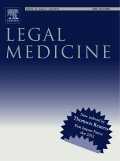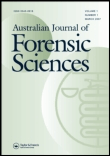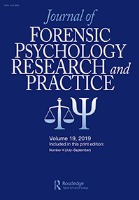
INTERNATIONAL JOURNAL OF LEGAL MEDICINE
Scope & Guideline
Shaping the Future of Forensic Science and Legal Practice
Introduction
Aims and Scopes
- Forensic Age Estimation:
Research in this area includes methodologies and techniques for estimating the age of individuals based on various biological markers, imaging techniques, and dental studies. - Molecular and Genetic Analysis:
This includes advancements in forensic DNA analysis, including sequencing technologies and the use of genetic markers for personal identification and kinship testing. - Toxicology and Drug Analysis:
Studies focusing on the detection and analysis of substances in biological samples, understanding drug-related fatalities, and the implications of drug use in legal contexts. - Postmortem Examination Techniques:
Research that enhances the methodologies for postmortem examinations, including autopsy practices, imaging technologies like CT and MRI, and novel techniques for assessing cause of death. - Forensic Anthropology and Odontology:
This area encompasses studies on human skeletal remains, dental identification, age estimation, and the application of anthropological techniques in forensic contexts. - Legal and Ethical Issues in Forensic Medicine:
Papers addressing the intersection of law, ethics, and practice in forensic medicine, including the implications of findings in legal settings. - Innovations in Forensic Technology:
Research on the development and application of new technologies in forensic science, such as artificial intelligence and machine learning for forensic analysis.
Trending and Emerging
- Artificial Intelligence in Forensics:
There is a growing trend toward integrating artificial intelligence and machine learning techniques in forensic analysis, improving accuracy and efficiency in various applications. - DNA Methylation and Biomarkers:
Emerging research is focusing on the use of DNA methylation as a biomarker for age estimation and other forensic applications, highlighting the role of epigenetics in forensic science. - Multidisciplinary Approaches:
An increasing number of studies are adopting multidisciplinary approaches, combining insights from various fields such as biology, chemistry, and engineering to enhance forensic methodologies. - Postmortem Interval Estimation:
There is a heightened emphasis on developing innovative methods for accurately estimating the postmortem interval using metabolomics and other advanced analytical techniques. - Microbiome Analysis in Forensics:
Research exploring the role of the human microbiome in forensic identification is gaining traction, indicating a shift towards understanding microbial signatures in forensic contexts. - Focus on Child and Adolescent Forensic Issues:
There is an emerging focus on forensic issues related to children and adolescents, including age estimation and the implications of findings in legal proceedings.
Declining or Waning
- Traditional Forensic Pathology:
There has been a noticeable shift towards more innovative and technological approaches in forensic science, leading to a decrease in traditional forensic pathology studies. - Historical Case Studies:
Research focusing on historical or retrospective case studies is becoming less frequent as the journal emphasizes contemporary methodologies and emerging trends in forensic science. - General Toxicology Studies:
Specific studies on general toxicology without a direct forensic application are less common, as the focus shifts to drug-related fatalities and their implications. - Basic Forensic Anthropology:
Basic anthropological studies without advanced methodologies or applications in legal contexts seem to be waning as more complex and technologically driven studies gain traction.
Similar Journals

Legal Medicine
Empowering professionals in legal medicine.Legal Medicine, ISSN 1344-6223, published by ELSEVIER IRELAND LTD, stands as a pivotal academic journal within the realms of forensic medicine and legal ethics. Operating from the Netherlands, this journal has established a strong reputation among researchers and practitioners since its inception in 1999, with the goal of advancing knowledge in the intersection of legal and medical disciplines. With a commendable Q2 categorization in both Issues, Ethics and Legal Aspects and Pathology and Forensic Medicine, it ranks among the noteworthy publications in these fields, placing it in the 51st percentile for Pathology and Forensic Medicine and 51st for Nursing-related ethical issues. The journal not only serves as a repository for innovative research and practical case studies but also emphasizes the importance of ethical considerations in medical legal scenarios. Although it does not offer Open Access options, it remains a crucial resource for professionals, researchers, and students seeking to stay informed about the latest developments that shape legal medicine. Access to its contents promises to enhance understanding and inspire advancements in both forensic science and the ethical frameworks surrounding them.

International Journal of Medical Toxicology and Forensic Medicine
Fostering Interdisciplinary Dialogue for Better OutcomesInternational Journal of Medical Toxicology and Forensic Medicine, published by Shaheed Beheshti Medical University of Medical Sciences & Health Services, is a pioneering platform dedicated to advancing knowledge within the critical fields of toxicology and forensic medicine. Established as an Open Access journal since 2011, it ensures wide dissemination of research findings, catering to a global audience of researchers, healthcare professionals, and students. With an ISSN of 2251-8762 and an E-ISSN of 2251-8770, the journal covers a diverse range of topics relevant to the medical community, albeit being categorized as Q4 in both Pathology and Forensic Medicine and Toxicology in 2023, indicating emerging significance in these disciplines. Geographically based in Tehran, Iran, it aspires to bridge gaps in scientific research and practice, particularly in regions where such expertise is critical. The journal welcomes submissions that investigate pressing issues in medical toxicology and forensic science, fostering an interdisciplinary dialogue essential for innovative solutions and improved public health outcomes.

JOURNAL OF FORENSIC SCIENCES
JOURNAL OF FORENSIC SCIENCES is a premier publication dedicated to advancing the field of forensic science through high-quality research and innovation. Published by Wiley, this journal has been a reliable source of cutting-edge findings since its inception in 1961, with a continued commitment to excellence expected through 2024. With an ISSN of 0022-1198 and an E-ISSN of 1556-4029, the journal covers critical aspects of forensic medicine, including genetics, pathology, and molecular biology. Notably, it holds a Q2 ranking in Pathology and Forensic Medicine, reflecting its high impact and relevance in the field. Researchers and professionals benefit from comprehensive access to groundbreaking studies and discussions that drive advancements in forensic methodologies and technologies. While not an open access journal, its impact factor and rigorous peer-review process ensure that every article contributes significantly to the body of forensic science knowledge. Whether you are a seasoned forensic expert or an aspiring student, the JOURNAL OF FORENSIC SCIENCES serves as an essential resource for cutting-edge research and discoveries.

Australian Journal of Forensic Sciences
Exploring the Depths of Forensic Medicine and PathologyThe Australian Journal of Forensic Sciences, published by Taylor & Francis Ltd, stands as a pivotal resource in the field of forensic medicine and pathology. With an ISSN of 0045-0618 and an E-ISSN of 1834-562X, this esteemed journal has been at the forefront of forensic research since its inception in 1968. Currently classified in the Q2 category for the year 2023 within its domain, it ranks 92nd out of 208 journals, placing it within the 55th percentile in Scopus rankings. The journal's scope encompasses a diverse range of topics critical to the advancement of forensic sciences, making it an essential platform for researchers, professionals, and students seeking to stay abreast of the latest developments and methodologies in the field. Although not an open-access publication, the journal serves as a crucial conduit for disseminating high-quality research, contributing significantly to the ongoing evolution of forensic practice and knowledge.

Forensic Chemistry
Unveiling truths with cutting-edge forensic analysis.Forensic Chemistry is a premier journal published by Elsevier, specializing in the interdisciplinary field of forensic science, with a strong emphasis on analytical and materials chemistry, pathology, and law. Established in 2016 and converging to a significant publication trajectory through 2024, the journal has rapidly ascended to an impressive Q1 ranking across multiple categories, demonstrating its impact and commitment to advancing forensic analysis and methodologies. With an impact factor reflecting its relevance—especially notable with a 95th percentile rank in Social Sciences and Law—Forensic Chemistry serves as an essential resource for researchers, legal authorities, and academics seeking to explore the latest developments in forensic techniques and applications. Its rigorous peer-review process and high-quality publications ensure that it remains at the forefront of scientific inquiry in forensic practices. Access to the journal is available without an open access model, further emphasizing its commitment to curated, high-impact scholarship that contributes to both theoretical foundations and practical applications in the forensic field.

Journal of Forensic Psychology Research and Practice
Advancing Insights into Criminal Behavior and Legal Processes.Journal of Forensic Psychology Research and Practice is a distinguished publication within the fields of Applied Psychology and Pathology and Forensic Medicine, published by Routledge Journals, Taylor & Francis Ltd. With a commitment to advancing knowledge from 2017 to 2024, this journal aims to bridge theory and practice by showcasing empirical research, including case studies and innovative methodologies, that address the complexities of forensic psychology in contemporary settings. While it holds a respectable Q3 ranking in both Applied Psychology and Pathology and Forensic Medicine, making it a vital resource for scholars and practitioners alike, its insights contribute significantly to understanding the psychological aspects of criminal behavior and legal processes. Researchers, professionals, and students are encouraged to engage with its content to further their understanding and application of forensic psychology principles in real-world scenarios.

Radiologie
Innovating Diagnostic Accuracy Through Cutting-Edge ImagingRadiologie, published by SPRINGER HEIDELBERG, is an emerging journal dedicated to the fields of radiology, nuclear medicine, and imaging. With an ISSN of 2731-7048 and E-ISSN 2731-7056, this journal does not currently offer open access, providing a traditional yet respected platform for scholarly communication. Founded in 2022, it aims to advance the understanding of cutting-edge imaging techniques and their applications in clinical practice, contributing to improvements in diagnostic accuracy and patient care. Despite its recent establishment, Radiologie is positioned within the Q4 quartile category, reflecting its developing presence in the academic landscape, with a current Scopus rank of #231 out of 333 in its category. The journal serves as a vital resource for researchers, professionals, and students seeking to stay abreast of the latest developments in radiological science, imaging technology, and their clinical implications, ensuring ongoing engagement and advancement in this critical area of healthcare.

International Journal of Electronic Security and Digital Forensics
Pioneering research in the realms of digital security and forensics.The International Journal of Electronic Security and Digital Forensics, published by INDERSCIENCE ENTERPRISES LTD, is a leading platform for disseminating scholarly research in the realms of cybersecurity, digital forensics, and electronic security. Established with the objective of bridging the gap between theoretical advancements and practical applications, the journal spans critical areas such as network security, legal implications of digital forensics, and reliability in safety measures. With its ISSN 1751-911X and E-ISSN 1751-9128, the journal aims to provide valuable insights into emerging technologies and methodologies while maintaining high academic standards, as reflected in its diverse quartile rankings across multiple categories in 2023. Operating from the United Kingdom and catering to a global audience, the journal is committed to fostering innovative research that contributes to safer digital environments. Researchers, professionals, and students will find a wealth of information and opportunities for collaboration in this specialized field, making International Journal of Electronic Security and Digital Forensics an essential resource for advancing knowledge and practice.

Rechtsmedizin
Pioneering Research in Forensic PathologyRechtsmedizin is a prestigious academic journal published by Springer, focusing on the critical field of forensic medicine and pathology. With a legacy dating back to 1995, this journal serves as a vital platform for disseminating advanced research and clinical findings that enhance the understanding of legal medicine and forensic science. Although it currently does not offer open access, it boasts an impressive Q3 ranking in 2023 within its category, indicative of its contribution to the field, with a Scopus rank of #149 out of 208 in Medicine, placing it within the 28th percentile of its peers. As a dedicated resource for researchers, professionals, and students, Rechtsmedizin aims to bridge the gap between clinical practice and forensic investigation, promoting the integration of scientific advancements into everyday applications within the legal context. With its location in New York City, USA, the journal remains a key player in the global discourse on forensic issues, thus inviting submissions that push the boundaries of traditional forensic methodologies and explore innovative approaches in legal medicine.

JOURNAL OF FORENSIC PSYCHIATRY & PSYCHOLOGY
Exploring the Nexus of Psychology and LawJOURNAL OF FORENSIC PSYCHIATRY & PSYCHOLOGY, published by Routledge Journals, Taylor & Francis Ltd, is a pivotal platform for advancing knowledge at the intersection of psychology, psychiatry, and the legal system. With an ISSN of 1478-9949, this esteemed journal has been providing a critical forum since its inception in 2003, continuing through to 2024, to foster interdisciplinary dialogue among researchers, clinicians, and legal professionals. The journal holds a Q3 category ranking in both Clinical Psychology and Psychiatry and Mental Health, reflecting its important contributions to the field. With a focus on empirical research, theoretical perspectives, and case studies, it aims to enhance the understanding of forensic issues while ensuring ethical considerations in psychological assessments and interventions. Although it currently does not provide open access, the journal's rigorous peer-review process assures high-quality publications. Researchers looking to stay at the forefront of forensic psychology will find this publication indispensable for their scholarly work and practical applications.